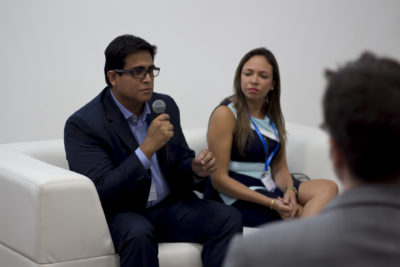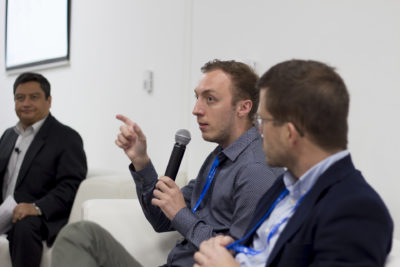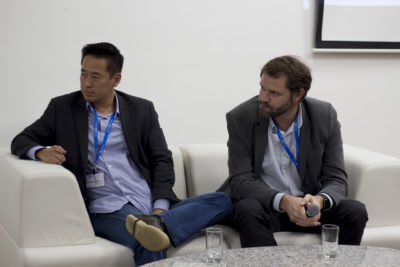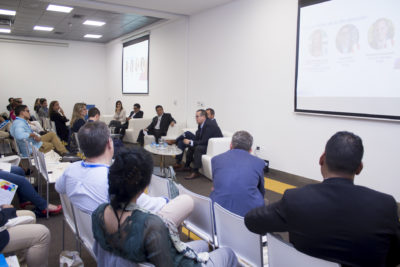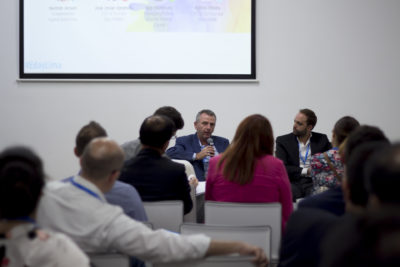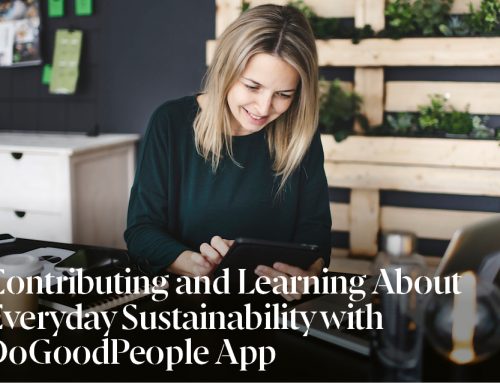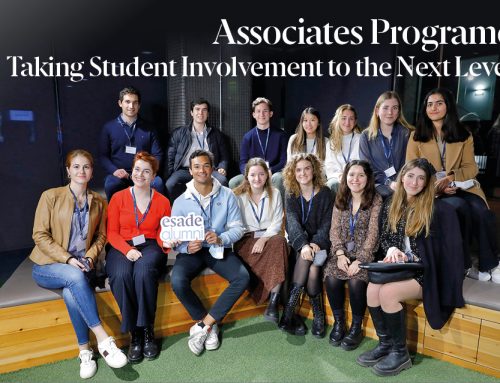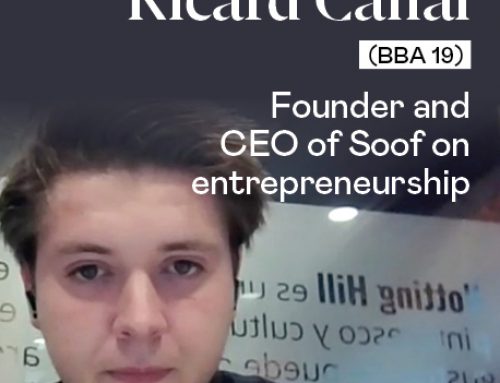1st ESADE Alumni Latin America Forum
Under the title “Innovating to survive in a global business setting”, the 1st ESADE Alumni Forum in Latin America brought together close to 150 ESADE graduates in Lima to tackle the subject of digital transformation and the challenges facing senior management, entrepreneurship, and family firms in this connection.
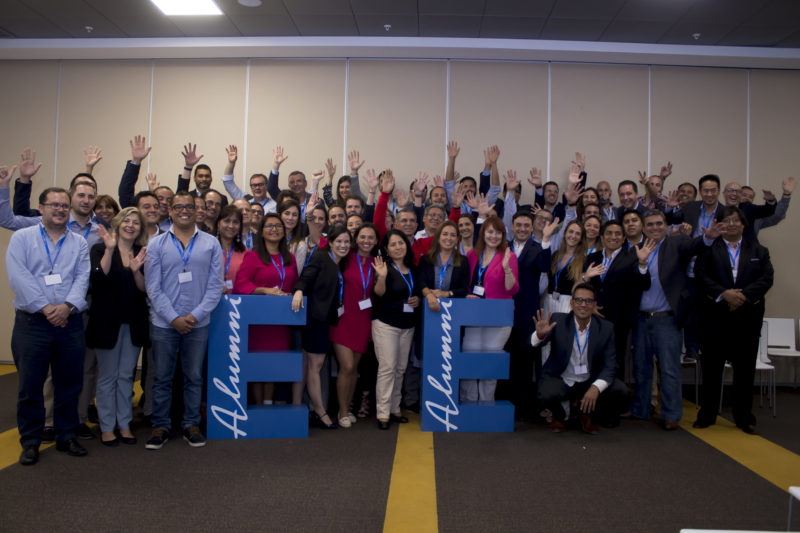
How should we innovate for success in today’s swiftly-changing world and get to grips with its uncertainties, complexities, and ambiguities? According to Luis Vives, the Associate Dean of the ESADE Full-Time MBA programme and Lecturer in the School’s Department of Management and Strategy, companies that successfully innovate “do not aim to eliminate their competitors but rather focus on creating better value for their customers, getting to know them better and anticipating their needs. Such firms go beyond the product and think up solutions, platforms, and ecosystems, placing the focus on innovating when it comes to the business model”.
These were some of the main arguments put forward by Vives in his lecture at the 1st ESADE Alumni Forum in Latin America, which was held on the 21st of April in Lima under the title ‘Innovating to survive in a global business setting’. The event, held by ESADE Alumni, brought together close to 150 graduates of the business school drawn from all over Latin America.
“Today, the key to success lies in being fast on one’s feet and quickly adapting to change, while working with others to come up with unique solutions that are more relevant to customers”, he added.
Innovation challenges
There are many aspects that come into play when it comes to digital transformation. According to Borja Rius, International Director at Roca Salvatella (Spain), “the issue is mainly one of change management and of creating new work practices and capabilities rather than one of technology”. Francesco Orlandino (MIM 09), Senior Digital Marketing Manager at Adidas (Panama), endorsed this view, noting “it is a cultural challenge in companies, especially in traditional sectors such as retail”. Nevertheless, introducing digital technologies [for instance, chat bots] “helps speed-up processes, optimise sales channels, and in general spur better communication, which in turn transforms the firm’s contacts with its customers”, underlined Rolando Carrazco (Corporate MBA 15), Director of Digital Transformation at ITLand (Peru). Nory Rodríguez (Corporate MBA 12), CEO and founder of Ginger Lab (Peru), argued that “the main investment that companies need to make today is in analysing their data. That is because data are key to grasping clients’ behaviour and winning customers’ loyalty. This information allows firms to react more swiftly and change their strategy master”.
In line with the foregoing, the shift in cultural and technology paradigms poses big challenges for senior corporate managers. The flip side of the coin is that it also opens up new opportunities. “The time has come for dialogue-based kinds of leadership. Leaders who take this approach are ones who do not brow-beat others but rather listen to them, guide them, and generally help their team members give their best. The younger generations are creating new kinds of leadership [for example, the case of Instagram’s ‘influencers’ was mentioned]. Managers need to detect and exploit this potential”, said Vera Sánchez-Latour (MMBA 15), Business Manager at PDC Capital (Guatemala). In the same vein, Edgar Callo, General Manager at Wong (Peru) stressed the importance of offering training plans to the youngest members of staff because, he said, “this fosters the emergence of natural kinds of leadership within the company”. Domenico Casaretto (MMBA 18), Executive Manager at Nestlé (Peru), observed that “Senior Management’s job is to inspire its teams to boost performance and this means creating a setting in which mistakes are not punished but rather seen as a chance to learn”. Another way of discovering areas for improvement is by analysing a firm’s big data, noted Alexandro Arias (MBA 04), Senior Sales Manager at Deloitte Mexico. He considered that this approach “is very useful for taking decisions at Senior Management level, given that it allows one to re-design and optimise processes, which in turn can greatly boost a company’s competitiveness”.
Last but not least, emotional intelligence seems to be a key element in entrepreneurship, in innovating in family firms, or in starting a new business. In the first case, as Herman Jensen (MMBA 15), Vice-President of Ingenio Santa Ana (Guatemala) noted, “There are turning points in a company’s life, such as generational succession, in which there may be resistance to change that is tinged with the emotions that tend to typify family relationships. These turning points need to be carefully managed so that they do not hinder innovation and progress within the company”. In the case of entrepreneurs, Igor Nishimura (CEMS 05), Managing Partner of Magnet Venture Capital (Brazil) stressed that “Self-knowledge is key to achieving resilience and forging ahead with the entrepreneurial project, making mistakes and recovering from them quickly so this one can push ahead with the business aims”. Matías Hilaire (PNMC 10), CEO and co-founder of The App Master (Argentina), added that “When we fail, it is vital to keep one’s head. One needs to tell oneself and others that the setback is just a temporary one”. This point was followed up by José Javier Jaramillo (MBA 17), CEO and founder of Zigo Hoteles (Ecuador): “Enthusiasm is catching both within and beyond the company”.
The ESADE Alumni network’s global reach
ESADE Alumni has over 63,000 alumni, of whom over 18,000 currently live outside Spain. They are spread throughout 100 countries worldwide. There are almost 4,800 in Latin America, of whom around 600 live in Peru. For organising its international activities, ESADE Alumni has 72 international chapters around the world (there are 14 chapters in Latin America).
During the 1st ESADE Alumni Forum in Latin America, Iñaki Ocaña (Lic&MBA 06/DARH 12), director of International Alumni Relations at ESADE Alumni, has awarded recognition to ‘ESADE Alumni Social’ project [solidarity initiative] and its TOGETHER programme, which provides pro bono consultancy services to the Third Sector on legal and management matters (NGOs, social entities and ventures, etc.). The event also featured contributions by Cristina Olavaria (Lic&MBA 99), ESADE’s Director of Admissions, and J. Omar Quintanilla (Corporate MBA 15), President of ESADE Alumni’s Lima Chapter.

